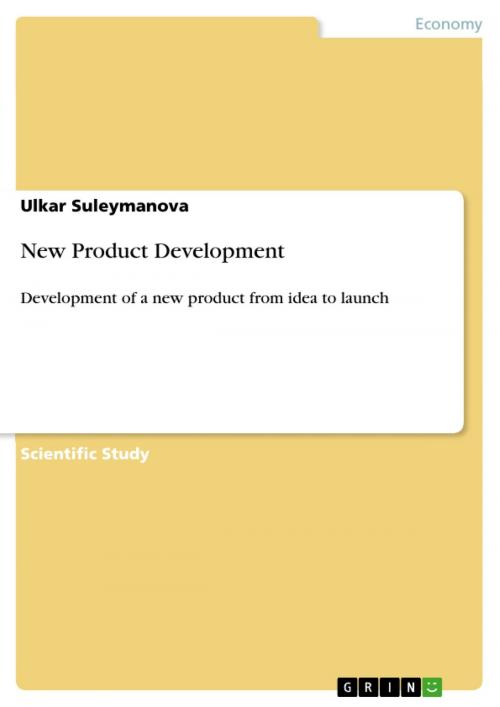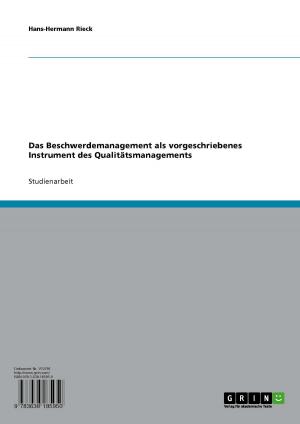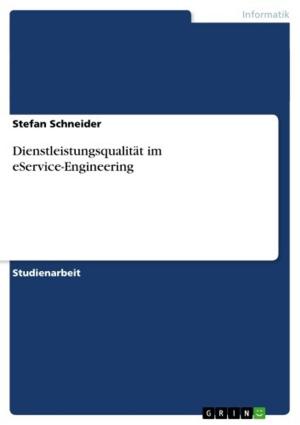New Product Development
Development of a new product from idea to launch
Business & Finance, Management & Leadership, Production & Operations Management| Author: | Ulkar Suleymanova | ISBN: | 9783668362789 |
| Publisher: | GRIN Verlag | Publication: | December 13, 2016 |
| Imprint: | GRIN Verlag | Language: | English |
| Author: | Ulkar Suleymanova |
| ISBN: | 9783668362789 |
| Publisher: | GRIN Verlag |
| Publication: | December 13, 2016 |
| Imprint: | GRIN Verlag |
| Language: | English |
Scientific Study from the year 2015 in the subject Business economics - Supply, Production, Logistics, grade: MA, University of Sheffield, course: 2014-15, language: English, abstract: This briefly examines the methods used by a new company to develop its first product. The company has been established from a team who worked in a business in the defence and aerospace industry, and their aim is to use their skills, knowledge and experience to develop low-cost solutions for consumers based on some of the principles they learned in their previous jobs. The company's core capabilities lie around the innovative use of distributed Wi-Fi transceivers combined with sensor systems. Such systems can be used to provide external security around an asset such as a car, caravan or boat. Because the system is rapidly deployable and can be broken down and re-used easily, it is suitable to temporary locations such as a car park, caravan park or marina. The use of analytical tools such as the concept statement, ATAR model, full screen, ideation testing and product protocol all point to a viable commercial opportunity. It is concluded however that due to the risk of replication by another company it is essential to get the product to market as soon as possible. At present, no direct competitors could be found on the internet. Given the nature of the target audience, who are likely to be geographically diverse and part of relatively niche markets, it is decided that the best approach to marketing will be based on e-marketing, exploiting special interest groups using social media platforms such as Facebook. There is also an option of targeted marketing using special interest periodicals and the potential to write articles for such organs to raise the profile of the product and the company. The process used is also shown to influence the shape of the product innovation charter and the organisational structure to optimise the potential for new product development, based on a project matrix approach.
Scientific Study from the year 2015 in the subject Business economics - Supply, Production, Logistics, grade: MA, University of Sheffield, course: 2014-15, language: English, abstract: This briefly examines the methods used by a new company to develop its first product. The company has been established from a team who worked in a business in the defence and aerospace industry, and their aim is to use their skills, knowledge and experience to develop low-cost solutions for consumers based on some of the principles they learned in their previous jobs. The company's core capabilities lie around the innovative use of distributed Wi-Fi transceivers combined with sensor systems. Such systems can be used to provide external security around an asset such as a car, caravan or boat. Because the system is rapidly deployable and can be broken down and re-used easily, it is suitable to temporary locations such as a car park, caravan park or marina. The use of analytical tools such as the concept statement, ATAR model, full screen, ideation testing and product protocol all point to a viable commercial opportunity. It is concluded however that due to the risk of replication by another company it is essential to get the product to market as soon as possible. At present, no direct competitors could be found on the internet. Given the nature of the target audience, who are likely to be geographically diverse and part of relatively niche markets, it is decided that the best approach to marketing will be based on e-marketing, exploiting special interest groups using social media platforms such as Facebook. There is also an option of targeted marketing using special interest periodicals and the potential to write articles for such organs to raise the profile of the product and the company. The process used is also shown to influence the shape of the product innovation charter and the organisational structure to optimise the potential for new product development, based on a project matrix approach.















